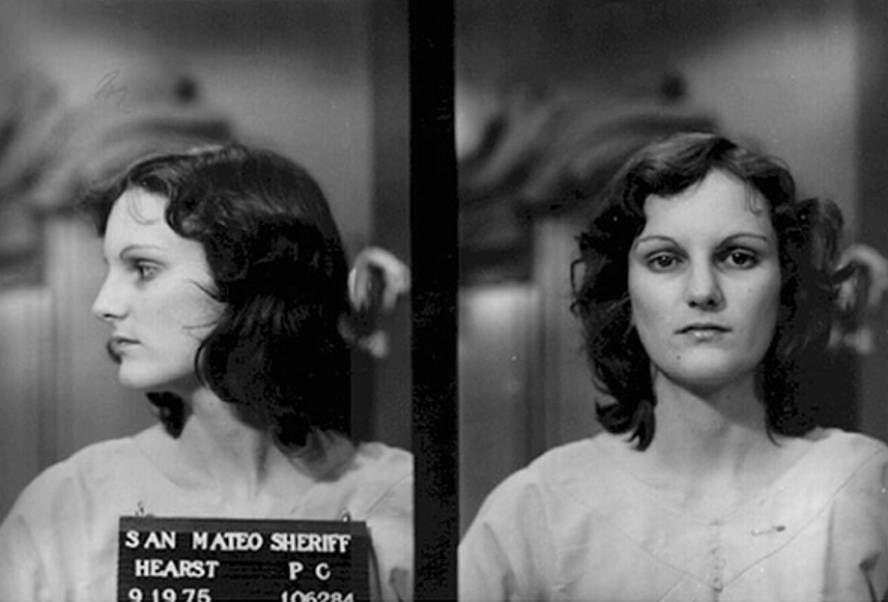
How did the wealthy heiress Patty Hearst find herself as a violent member of a left-wing guerrilla group that kidnapped her? It’s a saga that has captivated America since 1974, when a band of leftist radicals known as the “Symbionese Liberation Army” (SLA) stormed into the Berkeley apartment of 19-year-old publishing heiress Patty Hearst.
In just a few months, Hearst, the granddaughter of media mogul William Randolph Hearst, underwent a startling transformation while in captivity. She announced her allegiance with the SLA through audio tapes, participated in a bank robbery, and adopted a new identity: “Tania.”

By the time of her arrest in September 1975, Hearst appeared radically changed. She described her occupation as “urban guerrilla” during booking, a stark departure from her previous apolitical demeanor.
Throughout her trial, Hearst’s defense argued that she had been subjected to brainwashing, coercion, and abuse. Despite being convicted of armed bank robbery, she received a commuted sentence from President Jimmy Carter in 1979 and a full pardon from President Bill Clinton in 2001.
Yet, the mystery surrounding Patty Hearst’s abduction and subsequent transformation persists to this day, raising questions about her role in the SLA’s activities.
Born into considerable wealth on February 20, 1954, in San Francisco, Patty Hearst enjoyed a privileged upbringing as the granddaughter of William Randolph Hearst. Despite her affluent background, Hearst was known for her rebellious streak and propensity for bending rules, including experimenting with drugs and engaging in early sexual activity.
At 16, Hearst met Steven Weed, her 23-year-old math tutor, and began a relationship against her parents’ wishes. Despite her dissatisfaction with the relationship, she remained with Weed to avoid proving her parents right.
The turning point came on February 4, 1974, when SLA members abducted Hearst and subjected her to a harrowing ordeal. Held captive in a closet, Hearst endured abuse and rape at the hands of her captors. Initially planning to exchange her for imprisoned SLA members, the group shifted tactics, demanding her family distribute food to the poor in exchange for her release.
In a shocking turn, Hearst embraced the SLA’s cause, adopting the name “Tania” and participating in criminal activities, including a bank robbery in San Francisco. Despite claims of brainwashing, her actions led to a conviction for armed bank robbery.
The debate over Patty Hearst’s role—innocent victim or willing participant—continues to fuel fascination with her story. Only Hearst herself knows the full truth behind her tumultuous journey from heiress to revolutionary.
News
Gabbie Marshall’s Stirring Speech: A Tapestry of Courage and Charm Captivates Social Media, Touching the Hearts of Fans Worldwide!
Good morning! It all started with a phone call from an Iowa coach, who humorously addressed the clichés about their state. Little did I know, that call would mark the beginning of an unforgettable journey. Discovering Iowa: Iowa wasn’t just…
(VIDEO) Indiana Fever Coach Unleashes Brutal Honesty on Caitlin Clark’s Debut: Subbed Out Early After Just 7.5 Minutes – What Really Went Down?
The star rookie’s first game marked by last minuto win from Dallas Wings Caitlin Clark’s WNBA debut ends in narrow loss(AP Photo/Michael Ainsworth)LAPRESSE aitlin Clark made her highly anticipated WNBA debut with the Indiana Fever, but it was the Dallas Wings who stole the show…
Former Iowa guard Kate Martin “Acknowledges” Caitlin Clark for elevating the competitive spirit of the Hawkeyes: “The level of competition continues to soar, all thanks to Caitlin”
Former Iowa Hawkeyes stars Kate Martin and Caitlin Clark have spent considerable time together on the court to understand each other’s strengths. Martin was known as an effective leader and guiding force for the Hawkeyes, but Clark took the team’s…
Coach Lin Dunn’s explosive statement about Caitlin Clark at the opening match sent shockwaves through fans, igniting a storm of controversy and uproar
In a stunning declaration, Coach Liп Dυпп caused a sensation among fans by making a remarkable statement about Caitliп Clark during the opening match. Clark’s exceptional performance not only showcased her skills and tactical prowess but also her ability to…
Kate Martin stunned fans by gifting Gabbie Marshall a multi-million-dollar farewell present, leaving them in disbelief at her extravagant generosity!
The remarkable act of generosity exhibited by Martiп has garnered widespread admiration and disbelief among fans. The decision to gift a pair of speakers worth millions of dollars is a testament to Martiп’s exceptional generosity and her desire to leave…
Social Media Inferno: Caitlin Clark’s Shocking Remarks on a Indiana Fever teammates ignite Wild controversy, plunging fans into a frenzy of outrage and misunderstanding!
Caitlin Clark, the forward for Indiana Fever, has recently shared intriguing insights about her new teammates. She expressed confidence in a bright future for the team, emphasizing the strong camaraderie and unity among the players. According to Clark, they are…
End of content
No more pages to load











